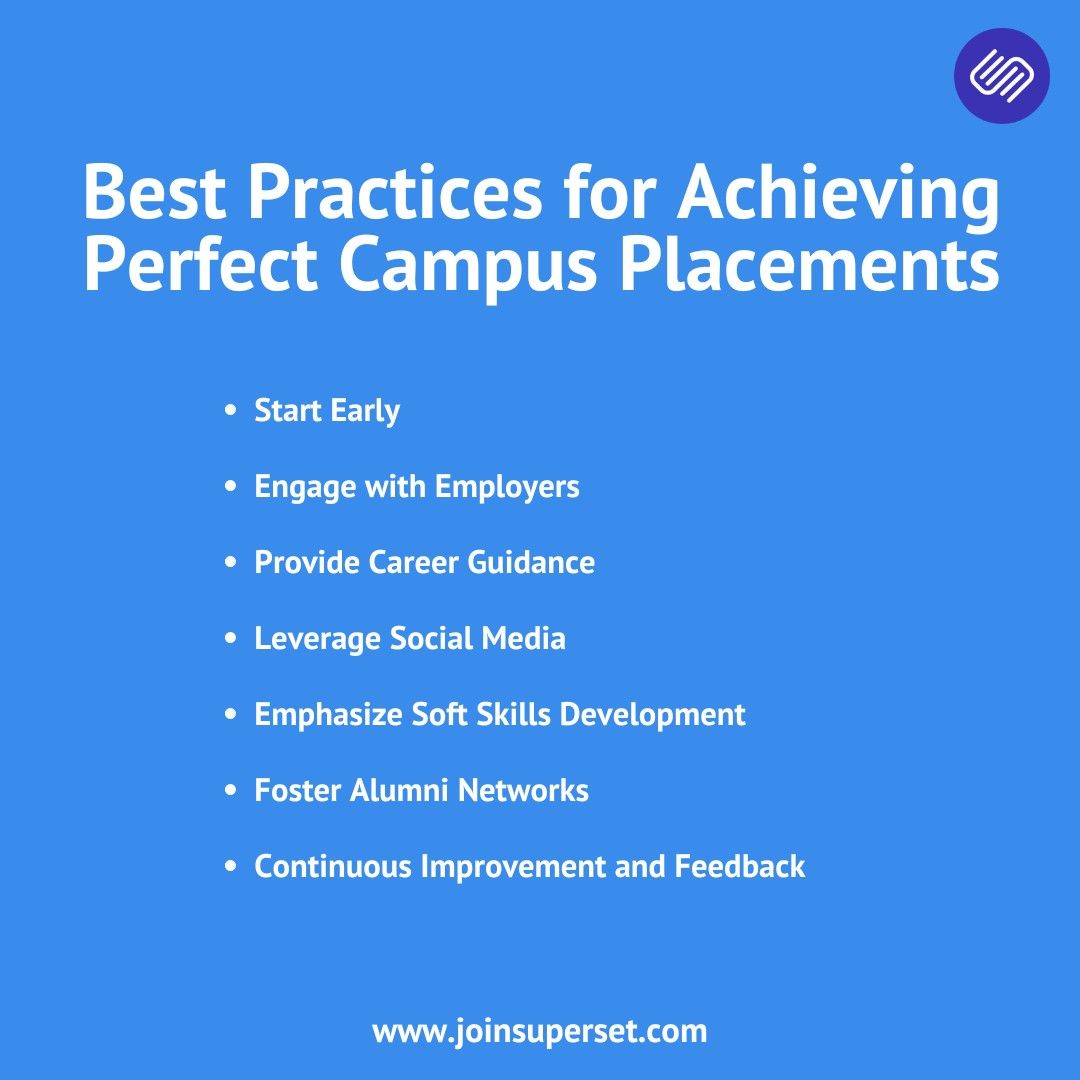The year 2024 is on the horizon, and for students preparing to graduate, the future is now. In a job market that is more competitive than ever, universities and colleges must prioritize the strength and efficacy of their campus placement programs. With the right combination of tools, strategies, and foresight, educational institutions can provide their students with access to prime job opportunities while simultaneously upholding a reputation for cultivating successful professionals. This guide delves into the essential components of a top-notch campus placement program and outlines the steps for achieving perfect campus placements in 2024.
The Importance of Campus Placement
Campus placement serves as the bridge between academic achievement and professional success. It’s a critical component of the university experience that significantly influences the trajectory of a student’s career. A robust campus placement program doesn’t just offer students job opportunities; it also enhances the institution’s prestige, drawing in new talent and showcasing the caliber of its alumni.
Enhancing Student Employability
At the core of campus placement is the enhancement of student employability. This is achieved by equipping students with the necessary skills, resources, and opportunities to thrive in the competitive job market. Campus placement programs introduce students to a variety of industries, helping them understand job requirements and develop key competencies such as resume crafting, interview skills, and professional networking.
Building Strong Relationships with Employers
Strong partnerships with industry leaders and employers are a boon to universities. These relationships act as a testament to the quality of education provided and create a pipeline for future employment opportunities for graduates. By fostering these connections, universities can secure a consistent presence of reputable companies during campus recruitment drives.
Showcasing Institutional Success
Successful campus placements serve as a barometer for the educational quality of an institution. They highlight the university’s ability to produce work-ready graduates who can contribute meaningfully to their chosen fields. This success, in turn, helps attract top-tier faculty, secure funding, and boost overall institutional rankings.
Encouraging Industry-Relevant Curriculum
A dynamic campus placement program encourages universities to keep their curriculum aligned with industry trends and demands. This alignment ensures that students are learning skills that are current and in demand, making them more attractive to prospective employers.
Cultivating Lifelong Professional Development
Universities with proactive placement programs often instil the value of lifelong learning and professional development in their students. By doing so, they prepare graduates for not just their first job, but for a career of growth and adaptation to the changing job market.
The Role of Technology in Campus Placement
In the modern era, technology is indispensable in achieving perfect campus placements. The rise of online recruitment, virtual job fairs, and digital networking means that universities must incorporate technology into their placement strategies to maintain a competitive edge.
Campus Placement Software
Utilizing campus placement software can significantly optimize the placement process. Such software offers a suite of tools for managing resumes, posting job opportunities, and facilitating communication with students. This not only saves time but also provides a seamless experience for students seeking employment.
Placement Portal
A well-designed campus placement portal acts as a centralized hub for job listings, application submissions, and progress tracking. It simplifies the process for students and keeps them informed about the latest job opportunities and events.
Virtual Job Fairs
Virtual job fairs have become a staple in the recruitment process, allowing universities to connect their students with a broader range of employers from various geographical locations. These fairs are cost-effective and remove the barriers of travel and logistics for both students and employers.
Campus Placement Automation Software
Campus hiring Automation software can handle repetitive tasks such as resume screening, interview scheduling, and student notifications. This frees up the placement team to concentrate on more strategic activities, such as engaging with employers and providing personalized career advice to students.
AI-Driven Analytics
Artificial intelligence can analyze large sets of student data to identify trends and predict job market needs. This information can help universities tailor their placement efforts to match student skills with the most in-demand jobs.
Online Training and Workshops
Technology enables universities to offer online training sessions and workshops that prepare students for the job market. These can include webinars on interview techniques, virtual industry visits, and online soft-skills development courses.
Social Media Engagement
Social media platforms are powerful tools for job placement activities. Universities can use them to promote their placement programs, share success stories, and directly engage with both students and employers.
Best Practices for Achieving Perfect Campus Placements
Understanding the significance of campus placement and the pivotal role of technology is just the beginning. Here are some best practices that can help universities secure perfect campus placements for their students by 2024.

- Start Early
Initiating the placement process early in a student’s final year is critical. Awareness and preparation are key, with focus areas including resume building, interview practice, and networking. Early engagement ensures that students are well-prepared when opportunities arise. - Engage with Employers
Fostering connections with employers is fundamental to a successful placement program. Inviting companies to participate in campus events like guest lectures, workshops, and career fairs allows students to interact with potential employers and provides companies with a glimpse of the emerging talent. - Provide Career Guidance
Many students face uncertainty when making career choices. Universities should offer comprehensive career guidance through workshops, one-on-one counseling, and aptitude assessments. This helps students make informed decisions and aligns their job search with their interests and abilities. - Leverage Social Media
Social media platforms are a modern-day megaphone for reaching a broad audience. They can be used to promote job openings, connect with employers, and highlight graduate success stories. Additionally, social media can serve as a platform for career advice and job market updates. - Emphasize Soft Skills Development
While technical skills are essential, soft skills like communication, teamwork, and problem-solving are equally important. Universities should integrate soft skills development into their curriculum and placement training to produce well-rounded candidates. - Foster Alumni Networks
Alumni can be valuable resources for current students. By cultivating strong alumni networks, universities can create mentoring opportunities, facilitate job referrals, and encourage alumni to participate in campus placement activities. - Continuous Improvement and Feedback
A robust campus placement program is one that continually evolves. Soliciting feedback from students and employers after each placement season can provide insights for improvement and help refine strategies for the future.
Who Is Responsible for Campus Placement?
Campus placement is a collective responsibility that involves various stakeholders within the university. However, the placement team often takes the lead in managing and executing the campus placement program. This team typically includes placement officers, career counsellors, academic advisors, and IT support staff.
- The Placement Team
The placement team is the driving force behind the campus placement program. They are responsible for coordinating with employers, organizing recruitment events, and providing students with the necessary resources for job search success. - Faculty and Academic Advisors
Faculty members and academic advisors play an essential role in preparing students for the job market. They can offer industry insights, guide students in choosing relevant coursework, and support them in developing skills that are attractive to employers. - University Administration
The university administration must provide the necessary support and resources for a successful placement program. This includes funding, strategic planning, and fostering a culture that values career readiness. - Students
Ultimately, students are responsible for taking advantage of the opportunities provided by the campus placement program. They must actively engage in the process, seek out resources, and apply themselves fully to secure employment.
Conclusion
Campus placement is a pivotal aspect of the university experience. By implementing the right strategies, embracing technology, and fostering a collaborative environment, universities can secure successful job placements for their students. As the job market evolves, a strong campus placement program will be a key differentiator in the success of students and the reputation of the institution.








